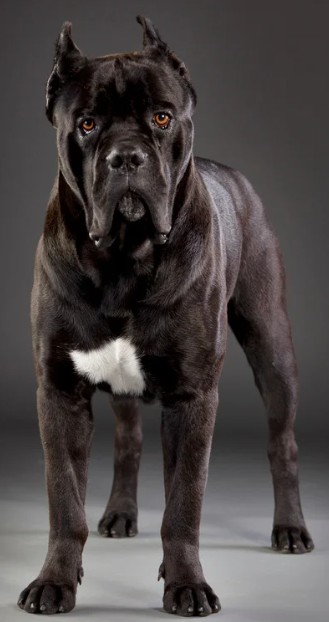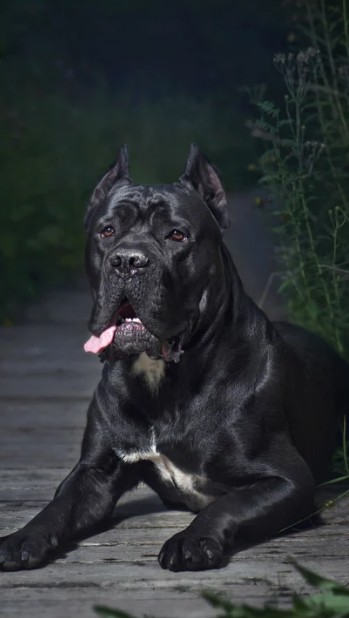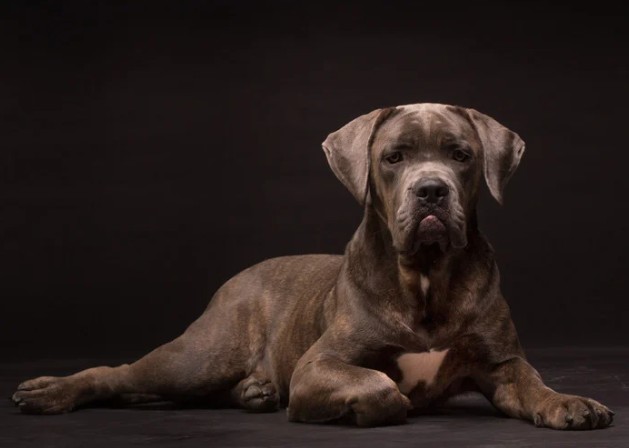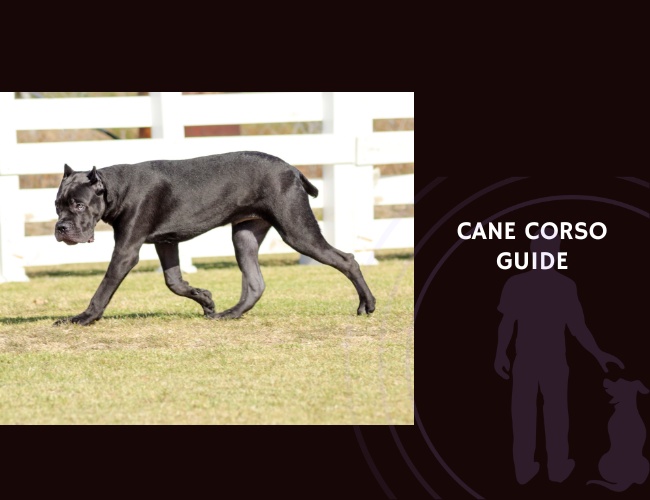Introduction to the Cane Corso
A Glimpse into History
The Cane Corso is a dog with a story as majestic as its appearance. These dogs trace their roots back to ancient Rome, where they first served as war companions and guardians for soldiers. As time passed, their roles evolved—Cane Corsos became trusted working dogs on Italian farms, helping with livestock and protecting property. This strong heritage shaped their loyal and courageous spirit, giving them the skills they still exhibit in modern homes today.
Distinctive Physical Traits
If you spot a Cane Corso, it’s hard not to be impressed. This breed stands tall and powerful, with a muscular build, broad chest, and well-defined head. Their coat is short but dense, coming in a range of classic colors like black, gray, fawn, and brindle. Their eyes are deep-set and typically dark, displaying intelligence and alertness. The Cane Corso moves with a combination of strength and grace, revealing its athletic heritage.
What Sets Them Apart
What makes the Cane Corso unique among large breed dogs? It’s not just their imposing look—it’s their combination of confidence, intelligence, and sensitivity. Bred for both strength and quick reaction, these dogs are loyal protectors, fiercely devoted to their families, yet always attuned to their environment. They thrive when given clear structure, gentle leadership, and a sense of purpose, making them an extraordinary companion for experienced handlers.
Understanding this breed’s roots and standout qualities helps build a stronger connection and appreciation for the Cane Corso as we discover more about their character in the next section.
Character & Temperament
Territorial Instincts and Assertive Personality
A Cane Corso’s roots as a Roman war dog and farm guardian are clear in its temperament. These dogs show strong territorial instincts, always keenly aware of their environment. You’ll notice their assertiveness—Cane Corsos stand tall with confidence, always ready to protect their space and loved ones. This assertiveness serves them well as guardians, but it also means they need stable leadership and ongoing training to keep behaviors balanced and safe.
Deep Loyalty and Primary Attachment
This breed forms powerful bonds with their families and, quite often, a primary handler. They are happiest when close to their people and will go the extra mile to protect family members. Due to their loyal nature, Cane Corsos can become distressed if left alone for long periods. They may develop separation anxiety if their need for companionship isn’t met.
Reserved Approach with Strangers
Cane Corsos are naturally selective, tending to be wary of strangers. New faces aren’t greeted with the enthusiasm you might see in more social breeds. Instead, they approach with caution. Without proper early socialization, their wariness can turn into fear or even distrust. The breed responds best to routines and environments where boundaries and roles are clear and predictable.
Sensitivity to Environmental Changes
Stability is vital for a Cane Corso’s wellbeing. They thrive when their environment is calm and predictable. In chaotic homes or settings with inconsistent rules, they may become anxious or stressed, which can lead to unwanted behaviors. Providing clear boundaries and steady routines offers them the security they need to feel at ease.
Building a stable home and a strong, trusting relationship lays the groundwork for the Cane Corso’s best qualities to shine.
Common Behavioral Challenges
Cane Corsos are powerful and intelligent, but their natural traits can sometimes create problems if not carefully managed. Let’s dive into a few of the most common behavioral challenges this breed faces and how owners can recognize and address them.
Over-guarding and Excessive Protectiveness
One of the most frequent concerns with Cane Corsos is over-guarding. Their ancient background as guardians means they instinctively protect their home and loved ones. However, this protectiveness can grow into a problem if the dog responds too quickly or aggressively to normal visitors or noise. Signs include barking, growling, or positioning themselves between their owner and guests. Without gentle limits, these behaviors can escalate, making social visits stressful for everyone.
Dominance and Aggression Tendencies
Cane Corsos are confident and assertive by nature. These qualities, while impressive, can sometimes turn into dominance-based aggression if the dog feels unclear about its role in the household. You might notice demanding behavior, reluctance to obey, or even posturing towards other animals. Consistent leadership and fair boundaries are key to preventing these tendencies from taking hold.
Reactivity from Poor Socialization
Reactivity is often rooted in fear or uncertainty, especially if a Cane Corso has not had enough positive experiences with new people, pets, or places during its early development. This can look like lunging, barking, or nervous withdrawal when faced with unfamiliar situations. Early, gentle socialization builds a confident, relaxed companion, helping avoid fear-based reactions later in life.
Understanding these challenges is the first step toward building a healthy partnership with your Cane Corso. This foundation sets the stage for teaching new skills and building trust in every interaction.
Training Essentials
The Power of Early Socialization
Early socialization is essential for Cane Corso puppies. This breed can be wary of new people and places, so exposing them gently and gradually to different sights, sounds, and situations builds confidence. Start socialization early—ideally before 16 weeks. Let your puppy meet friendly people, calm dogs, and safe environments. Controlled experiences help prevent fear-based behaviors that may turn into reactivity later on. Always keep interactions positive and short, allowing the puppy to explore at their own pace.
Positive Reinforcement: What Works Best
Cane Corsos respond best to positive reinforcement. Reward your dog with treats, praise, or a favorite toy when they follow your cues. This approach encourages them to repeat good behaviors. Avoid punishment or harsh corrections. Such tactics can break trust, cause anxiety, and may even increase aggression. Instead, remain calm, be patient, and celebrate small wins together—consistency is key to building a lasting partnership.
Setting Boundaries and Clear Leadership
A Cane Corso needs a steady, confident leader. Set clear rules from the start, such as where they can go or what objects are off-limits. Enforce rules the same way every time. Predictable routines and boundaries help your dog understand expectations and make them feel secure. Remember, leadership isn’t about dominance—it’s about clear guidance, patience, and making fair choices.
When training your Cane Corso, steady progress and patience will set the foundation for a well-behaved and confident companion.

Advanced Training Considerations
Building Leash Skills and Impulse Control
Working with a Cane Corso’s strength and instincts is vital. Early leash training helps ensure walks are enjoyable and safe for everyone. Using positive reinforcement like treats or praise, teach your dog to walk calmly beside you. Begin in quiet settings and practice regularly to prevent pulling and lunging.
Impulse control exercises, such as “sit” and “wait” before crossing streets or greeting people, help your Cane Corso manage excitement. Practice these skills daily, rewarding patience and calm behavior. Over time, this builds self-restraint and makes handling in public much easier.
Teaching Public Manners
Cane Corsos can be wary of new people and animals, so practicing good manners in public keeps outings stress-free. Start with short visits to quiet areas, gradually increasing exposure to busier parks or neighborhoods as your dog shows readiness.
Encourage calm and neutral reactions around strangers and dogs. If your Cane Corso reacts, redirect their attention to you and reward focus. Consistent practice helps reduce unwanted behaviors such as barking or jumping and boosts your dog’s confidence in new situations.
Avoiding Dominance-Based Approaches
Harsh or dominance-based training methods are not suitable for the Cane Corso. These tactics can lead to fear, anxiety, or even aggression. Instead, use calm, confident leadership and set predictable routines. Clear rules combined with kindness build trust and a strong bond. Positive reinforcement always offers better, safer results for this loyal and sensitive breed.
Structured training and gentle guidance prepare your Cane Corso to thrive both at home and in public settings, building a foundation for lifelong success.
Nutritional Requirements
Puppy Nutrition for Healthy Growth
Giving your Cane Corso puppy the right start is crucial. During the first 18-24 months, choose a high-quality large breed puppy food. Look for a controlled calcium-phosphorus balance—this helps bones and joints develop properly and reduces the risk of orthopedic issues. Avoid overfeeding; extra weight is tough on growing joints and can lead to health problems later in life. Be sure to monitor your puppy’s body condition, and adjust portions to support steady, healthy growth.
Adult Diet Essentials
When your Cane Corso reaches maturity, it’s time to transition to an adult large breed formula. Focus on lean protein to maintain muscle and energy while keeping fat at a moderate level—this supports a fit, active lifestyle but prevents excess weight gain. Ingredients matter! Choose foods with fish, chicken, or beef as primary proteins and limit artificial additives. Consistently check your dog’s body condition and energy levels to make sure the chosen food is meeting their unique needs.
Joint and Wellness Supplements
Cane Corsos are prone to joint concerns, so adding supplements for ongoing health can be helpful. Consider glucosamine and chondroitin for joint support, and omega-3 fatty acids for overall wellbeing and a healthy coat. These additions can keep your dog moving comfortably and help prevent issues common with large breeds.
Providing optimal nutrition prepares your Cane Corso for a healthy, active life. Next, let’s make sure feeding routines match their unique lifestyle and needs.
Feeding Practices
Portion Control and Meal Timing
Cane Corsos are prone to a life-threatening condition called bloat (gastric dilatation-volvulus). To lower this risk, it’s best to feed your dog several small meals throughout the day rather than one large meal. Always avoid feeding just before or right after intense activity, as this can also trigger bloat. Keeping your Corso’s feeding routine consistent helps their digestion and reduces health risks.
Individualized Diet for Every Stage
Your Cane Corso’s diet should be tailored for their life stage and activity level. Puppies, adults, and seniors each have different needs. A young, active dog will burn more calories and may require larger portions or higher calorie food compared to a calm, older companion. Likewise, working dogs or those with higher activity should eat food with more protein and fat. Be alert to changes like pregnancy, lactation, or shifts in activity, and adjust meals as needed.
Monitoring Weight and Adjusting Meals
Regularly check your Cane Corso’s weight and body condition. If you notice sudden weight gain or loss, review their feeding plan. Overfeeding can strain joints and cause other health concerns, while underfeeding may leave your dog tired or undernourished. Use a portion cup or scale to measure food, not just guesswork. Adjust meals promptly to match real needs, and consult your veterinarian if unsure.
By focusing on consistent feeding routines and paying attention to individual needs, you can keep your Cane Corso healthy and energetic.
Confident. Loyal. Uncompromising.
This is not a dog for the passive or unsure.
The Cane Corso was never bred to follow anyone blindly. A product of Roman battlefields and Italian farms, this breed carries itself with dignity, strength, and deep-rooted purpose. Behind its muscular frame lies a discerning mind—one that reads people, environments, and energy with unnerving precision.
Their loyalty runs deep—but only to those who’ve earned it.
These dogs don’t hand out affection like candy. They bond intensely with their chosen few, often forming a singular attachment to one handler. That bond is sacred, unshakeable—but also exclusive.



Raise one right, and you won’t find a more devoted companion.
When led with respect and calm authority, the Cane Corso becomes a mirror of your strength. It will walk beside you—never in front, never behind—guarding your world with unspoken loyalty. This breed doesn’t just live in your home. It becomes part of its structure, part of your rhythm.
Health Concerns & Common Diseases
Orthopedic Issues
Cane Corsos are strong and athletic, but their size puts them at risk for orthopedic problems. Hip dysplasia and elbow dysplasia are two of the most common concerns. These conditions can lead to joint pain, stiffness, and trouble getting up or moving around. Regular veterinary checkups and choosing breeders who screen for joint problems can help minimize the chance of your dog developing these health issues. Maintaining a healthy weight and feeding a diet with joint-supporting supplements, such as glucosamine and chondroitin, can offer added protection during all life stages.
Gastric Dilatation-Volvulus (Bloat) Risks
Because of their deep chest, Cane Corsos are predisposed to bloat, or gastric dilatation-volvulus (GDV), which is a life-threatening condition. Bloat occurs when the stomach fills with gas and sometimes twists. Warning signs include a bloated abdomen, restlessness, and trying to vomit without bringing anything up. Important preventative steps include feeding several smaller meals daily, avoiding vigorous activity right before and after eating, and monitoring for sudden changes in appetite or behavior.
Other Breed-Specific Health Concerns
- Eye Issues: Problems like entropion (where the eyelid rolls in) and cherry eye can affect vision and comfort.
- Cardiomyopathy: Some Cane Corsos may develop heart disease, especially if overweight or as they age.
- Skin Disorders: Conditions such as demodectic mange and autoimmune-related skin diseases sometimes occur.
Prompt veterinary care and ongoing health checks are the best ways to catch these conditions early and keep your Cane Corso healthy.
By staying proactive with health monitoring and lifestyle adjustments, you help your Cane Corso enjoy a vibrant, active life.
Lifespan & Preventative Care
Understanding Lifespan Expectations
Cane Corsos typically enjoy a lifespan of 9-11 years. With thoughtful care and responsible breeding, some may even reach their early teens. Genetics, nutrition, and environment all play vital roles in how long your dog will live and, importantly, how healthy those years will be. Prioritizing preventative care helps ensure your Cane Corso stays active and happy as they age.
Preventative Measures for Better Health
Proactive steps can truly make a difference in the life and vitality of a Cane Corso. Here’s what we recommend:
- Maintain a healthy weight with a nutrition plan tailored to large, active breeds.
- Provide regular exercise—about 60-90 minutes daily—to preserve joint function and mental health.
- Manage portions and meal timing, splitting meals into smaller servings to help prevent bloat.
- Use joint supplements, such as glucosamine and chondroitin, especially as your dog grows older.
Good grooming also helps with early detection of skin or eye issues. Keep a close watch for signs of discomfort, swelling, or changes in appetite.
Importance of Regular Veterinary Visits
Routine veterinary checkups are the backbone of Cane Corso wellness. Veterinary visits, at least once a year, allow early detection of serious issues like orthopedic problems, bloat, or cardiomyopathy. Vets might recommend screenings for hip and elbow dysplasia, as these are common in the breed. If you notice limping, lethargy, or digestive troubles, don’t wait—early intervention is key.
By supporting your Cane Corso with regular checkups and thoughtful daily care, you’re setting them up for the healthiest life possible. Keeping these essentials in mind will make your journey together even more rewarding.

Ideal Living Environment
Creating an Environment Where Your Cane Corso Thrives
Cane Corsos are happiest in calm homes with predictable routines. Their strong sense of loyalty and territorial instincts make them well-suited to a stable household where everyone knows their role. Sudden changes, loud noises, or bustling activity can stress these dogs, so a peaceful atmosphere matters for their wellbeing.
The Importance of Space and Security
A Cane Corso is a large, athletic breed that needs plenty of room to move. Ideally, they should have access to a secure, spacious yard with sturdy fencing. This lets them safely explore, play, and patrol without risk of escape or unwanted interactions. Apartment life or small, unsecured spaces may not meet their needs. A roomy environment helps channel their energy in healthy ways and prevents frustration-driven behaviors.
Structure, Boundaries, and Predictability
Cane Corsos do best when daily life follows a routine. Knowing what to expect each day reduces anxiety and helps them feel confident. Consistent rules, daily walks, set feeding times, and regular training sessions all provide the structure these dogs crave. Secure fencing and defined boundaries indoors, like baby gates, can also help reinforce expectations.
Matching Lifestyle and Temperament
Their strong bond with their family means Cane Corsos rely on your consistent presence. They do not enjoy being left alone for long periods. Households with experienced owners who can provide consistent leadership—along with scheduled exercise and interaction—are best. In contrast, chaotic homes, multi-dog households with unstable dynamics, or densely populated urban settings often create too much unpredictability for this sensitive breed to handle.
Establishing the ideal environment means prioritizing your Cane Corso’s need for space, security, and stability every day.
Exercise & Mental Stimulation
Daily Physical Activity Needs
A Cane Corso is a powerful and athletic dog that thrives on regular activity. We recommend 60-90 minutes of daily exercise to meet their needs. This can be split into two walks, active play in a secure yard, or even structured activities such as fetch or tug-of-war. An under-exercised Cane Corso may become restless or bored, which can lead to unwanted behaviors at home.
Balancing Physical and Mental Stimulation
It’s not just about burning energy—mental challenges are equally important for this intelligent breed. Training sessions, interactive puzzle toys, and learning new commands help keep their minds sharp. Try hiding treats in safe areas of your yard and encourage your Cane Corso to find them, or rotate puzzle toys to maintain interest. Short but frequent mental workouts are often more effective than long, repetitive tasks.
Structured Engagement Techniques
Consistent routines are key. Plan activities with your Cane Corso that reinforce positive behaviors and strengthen your bond, such as:
- Practicing obedience exercises during walks
- Incorporating short impulse control games, like “wait” before doors or meals
- Rotating interactive toys to avoid boredom
- Providing safe chew items for independent play
Structured engagement doesn’t mean constant supervision, but regular check-ins and direction are important. This breed is happiest when challenged—both physically and mentally—by a confident, present handler.
Caring for your Cane Corso in this way sets the stage for a healthy, stable companion at home. Proper exercise and stimulation are essential to their overall happiness and well-being.
Is a Cane Corso Right for You?
Understanding the Ideal Owner
The Cane Corso is not for everyone. This breed thrives best with experienced dog owners who can offer calm leadership and consistent training. Are you someone who enjoys spending time daily on both physical exercise and mental games? These dogs need structured routines and positive socialization. A good Cane Corso owner is patient, confident, and ready to embrace the responsibility of a large, powerful guardian dog. This breed generally forms its strongest bond with a single, dedicated handler, so consistency in family roles is important.
Situations That Don’t Work
Some home situations and lifestyles are simply not a good match for the Cane Corso. Busy households with lots of chaos or unpredictable routines can trigger stress and anxiety in this breed. If you live in a crowded urban setting without a private, secure yard, it may be tough to meet your dog’s exercise and mental stimulation needs. Multi-dog households with unstable or unclear pack order can also create behavioral challenges. First-time dog owners or those looking for a low-maintenance pet should consider another breed.
What to Expect: Realistic Rewards and Challenges
Cane Corsos offer deep loyalty, protection, and companionship—but their assertiveness and intelligence demand clear boundaries and daily structure. Be ready to manage strong guarding instincts and be proactive with socialization. If you provide a stable environment and regular, constructive engagement, your Cane Corso will likely thrive, becoming a confident and loving family member.
A stable, supportive home sets the stage for a healthy, happy Cane Corso.
Conclusion & Resources
Key Takeaways for Cane Corso Owners
Owning a Cane Corso is both a privilege and a commitment. Their legacy as Roman war dogs shines through in their assertive personalities, strong loyalty, and imposing presence. These dogs need clear boundaries, firm but gentle leadership, and a calm environment to truly thrive. If you’re considering a Cane Corso, remember they do best with an experienced owner who can provide daily structure and positive reinforcement.
Being selective with strangers and sensitive to change means socialization should start early and stay consistent. Regular mental and physical exercise is vital. Their unique blend of protectiveness and intelligence creates a rewarding bond but also demands responsibility.
Continuing Education and Support
A supportive network is crucial for both new and experienced owners. Seek out trusted trainers who specialize in large guardian breeds. There are community forums and breed clubs online where you can exchange tips and experiences with fellow Cane Corso owners. Consider subscribing to reputable dog health publications and following veterinary advice for ongoing learning.
Responsible Ownership and Breeding
With a breed like this, responsible practices matter. Prioritize health screenings, ethical breeding standards, and preventative care to reduce the risk of inherited health conditions. Ensure your dog’s environment is safe and stable, and always promote humane training techniques. Awareness and preparation are the top ways to ensure a long, happy partnership with this outstanding breed.
Continue building your knowledge and confidence as a dedicated Cane Corso owner—your companion deserves nothing less.










